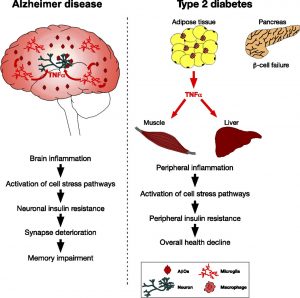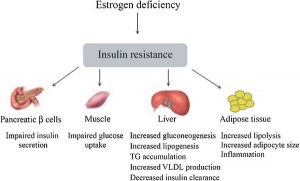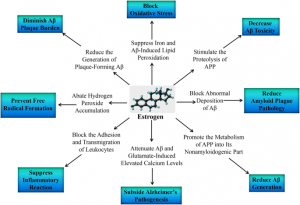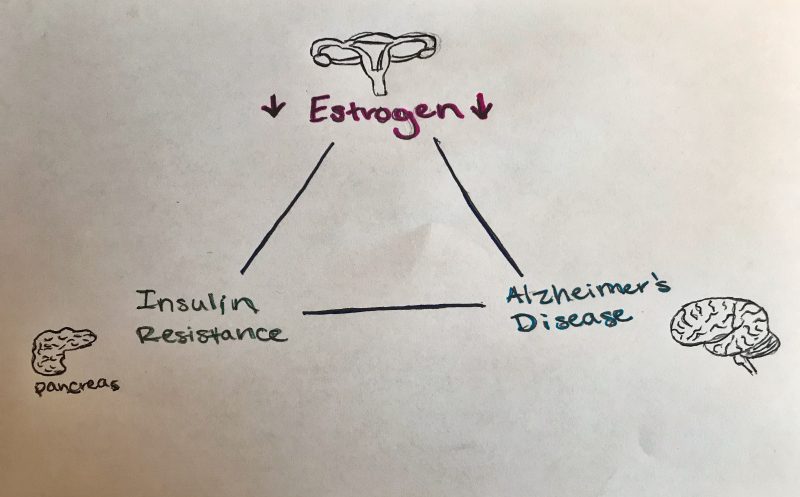Insulin Resistance and Alzheimer’s Disease:
The first two members involved in this complicated love triangle are insulin resistance and Alzheimer’s Disease. There is a remarkable link between the two, as insulin resistance increases the likelihood that an individual develops Alzheimer’s Disease, and vice versa. This connection between these two conditions are the result of a variety of overlapping mechanisms at the cellular level that contribute to the development of one or both ailments.
Insulin has numerous beneficial effects throughout the brain including protection for neurons, growth and survival of neurons, and reinforce neuroplasticity, a mechanism that allows for long-term memory consolidation and maintenance. When there is a deficiency in insulin as a result of insulin resistance, these neuroprotective effects are absent and put the brain at higher susceptibility to developing Alzheimer’s Disease.

Estrogen and Insulin Resistance:
The other member in this love triangle is the reproductive hormone, estrogen, that prepares the lining of the uterus for pregnancy, along with a number of body-wide effects. Low levels of estrogen have been linked to insulin resistance in numerous studies, suggesting a prominent role of estrogen in maintaining normal insulin signaling. This deficiency in estrogen that leads to insulin resistance that, as mentioned above, can put an individual at a greater risk of developing Alzheimer’s Disease.

Estrogen and Alzheimer’s Disease:
Decreased levels of estrogen can also directly increase the likelihood of the development of Alzheimer’s Disease, in addition to the role of estrogen in insulin resistance, as demonstrated above. This effect can be seen in the form of estrogen as a neuroprotective agent in the brain. In particular, estrogen helps to prevent the synthesis and accumulation of beta-amyloid (Aß) plaques. These plaques have neurotoxic effects within the brain, as the presence and buildup of these molecules have shown to be a primary root cause of Alzheimer’s Disease.

Clinical Applications:
Menopause is categorized by decreased estrogen levels as those who menstruate age. This stage of reproductive health therefore leads to an increased risk of developing insulin resistance and eventual Alzheimer’s Disease as a result of estrogen deficiency.
Since low estrogen has indeed been linked to insulin resistance, this is largely why post-menopausal women tend to gain weight and have a greater likelihood of developing Type 2 Diabetes. Additionally, menopause as a result of surgical hysterectomies, in which the ovaries are also removed, results in two times greater likelihood of developing Alzheimer’s disease in those who underwent the procedure than those who did not. This increased risk is largely associated with a loss of estrogen. These clinical commonalities further emphasize the role of estrogen in the protection against both insulin resistance, and ultimately, Alzheimer’s Disease.
Estrogen as a Potential Treatment Option
Estrogen is one of the best-studied drugs for potential use in the prevention and/or treatment of Alzheimer’s disease. Estrogen therapy can reduce the cognitive decline observed in women that have gone through either natural or surgical menopause. This form of therapy can therefore help to delay or be used in the treatment of both Alzheimer’s Disease and Type 2 Diabetes. Supplemental estrogen also improves the function of Tacrine, an anticholinesterase drug that is used for the treatment of Alzheimer’s Disease, thus demonstrating that estrogen may enhance existing treatments for Alzheimer’s Disease. Further research regarding the therapeutic effects of estrogen should be pursued, as its positive effects in preventative measures against insulin resistance and Alzheimer’s Disease are invaluable in the fight against these health issues.
Abstract (Featured Image) created by S. Wiger
